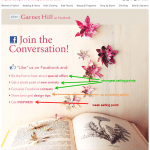In part 2 of our series on PPC advertising traps for health clubs, we focus on the unique traps that our industry faces when advertising on Facebook.
If your health club’s advertising crosses paths with Facebook, you may have already encountered one or more of these “gotchas” to Facebook, and social media advertising in general.
Despite the lack or laxity of rules pertaining to personal content, Facebook advertisers must actually conform to no fewer than 29 policies on prohibited content and nearly a dozen types of restricted content. Here are just a few.
Most of the outright prohibitions, as with AdWords, should be quite obvious:
- Ad content that violates community standards. This includes material that is disrespectful of individuals or groups based on race, ethnicity, national origin, religion, gender, gender identity, or advocates or depicts violent, sadistic or exploitative acts. Exceptions may be made occasionally — for instance, for ads advocating against such behaviors — but these topics are “third rails” and touching them is at the advertiser’s peril.
- Ads containing profanity.
- Ads containing deliberate grammatical or spelling errors intended to circumvent content filters (see our article on the similar guidelines for AdWords).
- Illegal products or services. Typically things like narcotics and prostitution, adult products or services, illicit drugs, misuse of prescription drugs, etc.; but also includes ads for products or services that are unsafe, exploitative, or misleading.
- Counterfeit products or services, no matter how legal or allowable the legitimate version would be.
- Tobacco products, weapons, ammunition, or explosives.
- Ads that infringe on copyrights and intellectual property rights. It’s a best practice anyway to stay away from referencing other brands directly. Your ad is about your business, not theirs!
Some are less obvious.
- Nudity or other overtly sexual content. Nudity below the waist is generally forbidden in Facebook advertising. Most smart businesses shy away from using nudity to sell anything, but in the advertising world — and especially in health club advertising — the appeal of a well toned, athletic body is part of why fitness sells. And sometimes, if it’s appropriate to the subject being advertised, Facebook may deem it OK to show a mother breastfeeding an infant. But as we wrote in our segment last month on Google AdWords search and display advertising, zooming in on tight butts or well-endowed busts is a surefire way to get your ad disapproved.
- Nonexistent functionality. If your product doesn’t work… or work yet, then wait until it does before you advertise it.
- Video ads that use a lot of text. Facebook generally limits text to about 1/5th of your screen space, mostly because people don’t want to reach that much at a time. Facebook will actually disapprove an ad because it has too many words in a screen. Our advice is that you don’t absolutely need the text in the video or background image, communicate the same thing in a picture — for instance, showing two people handshaking often communicates the idea of a contract without actually showing one on the screen.
Some of Facebook’s advertising policies, especially ones related to health and wellness content, are not very obvious at all, or way more nuanced than one might expect.
- Before-and-after pictures or atypical results.
- Controversial content. If “doctors don’t want you to know” about product X, neither does Facebook… and with good reason.
- Sensational or misleading content. This includes herbal cures, remedies or supplements to “reverse diabetes.” Such claims are at best erroneous and misinformed, and at worst, fraudulent, whether or not that’s your intent. If you want to really understand what is and isn’t effective in the treatment of type 2 diabetes (the type most often associated with obesity), visit the American Diabetes Association.
- Unsafe supplements. What constitutes an unsafe supplement is at Facebook’s discretion, but it’s generally similar to Google’s policy on AdWords of denying ads that market supplements containing an active pharmaceutical.
- Ad content or images that are disrespectful of people with serious health of physical issues. This includes body shaming, fat shaming, and related types of content.
- Ads that “assert or imply personal attributes” on basis of demographic info such as race, gender, gender identity, ethnicity, national origin, religious belief, medical condition, etc. Notice that this is not the same as the editorial guideline prohibiting defamatory use of personal characteristics. This editorial guideline says that it’s generally disapproved to target specific groups with ads that appear to be based on the assumption that “you’ve met one, you’ve met them all.” For instance, assuming that anyone with type 2 diabetes just can’t control their cravings for sugary sweets.
- Depictions of bad body image, cartoonishly overweight people, etc. That’s right: that overweight lady staring at the “244” on the scale is off limits, as is a chubby kid frowning at a salad, or the tired road warrior wolfing down a hamburger as two buttons pop off his dress shirt are very often off limits — and it can be even more frustrating to put time into a great ad campaign built around those images, only to discover they’re not allowed. Our advice: don’t go there. It’s just making fun of people in the midst of their misery, and you’re not making friends or potential new customers in the process.
All of which make it very difficult to sell things like weight loss in the traditional, print-marketing kind of way.
And… last but not least — and perhaps the most frustrating of all — using the words “you”, “your”, and related terms in fitness ads. Facebook is especially picky about insisting that advertisers focus not on personal problems and negative outcomes, but on health and wellness vendors’ services and positive outcomes.
Facebook ads that focus on the person, rather than the service offered, are usually disapproved. So are ads that focus on personal problems or worries, or on painting verbal or pictoral images of cartoonishly overweight, depressed, pain-plagued diabetics.
So when your health, wellness, or fitness business thinks about running an ad on Facebook, ask yourself these questions:
- When I think about my typical prospect’s problems, issues, or concerns — from their perspective — what do I think about? Hint: dig past the “not being fat” part to what your prospect feels they can DO that they couldn’t do before. It is playing outside with the kids? Is it feeling happy about life? Something else?
- Now, without focusing on your customer’s personal problems, how do these better futures manifest? Is it self-confidence, serenity, strength of mind, spirit, and body? Something else?
- Ask yourself, again from the customer’s perspective, how you-the-customer see yourself gaining that confidence and strength? Is it personal coaching? A couch-to-5K program? “Beginner Yoga For The Unbendy”? Gentle Tai Chi for balance and peace?
- Finally, thinking about those programs or club offers, what questions might prospective customers have, and how can your ads answer those questions before they’re asked?
You’ll find that over time, your Facebook ads will be more positive, more compelling, easier to read, and more quickly approved by Facebook and liked and shared by your prospects.
Which is good for everyone involved.



